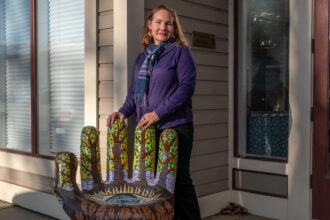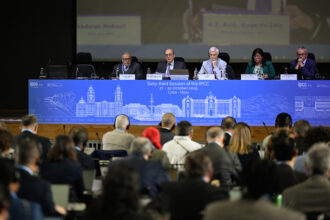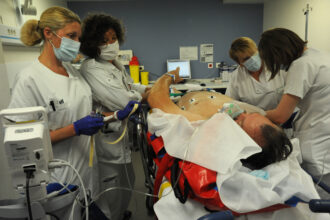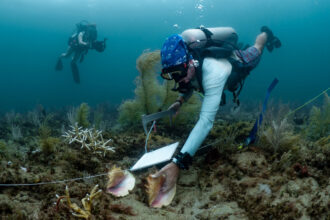The heads of 18 major physician groups from around the world are calling on doctors today to take an immediate, vocal stand for climate action to avoid a global health catastrophe.
In a letter published online in The Lancet and The British Medical Journal, they write:
“In December of this year, world governments meet in Copenhagen, Denmark, to negotiate a new UN Framework Convention on Climate Change. There is a real danger that politicians will be indecisive, especially in such turbulent economic times as these. Should their response be weak, the results for international health could be catastrophic.”
“As leaders of physicians across many countries, we call on doctors to demand that their politicians listen to the clear facts that have been identified in relation to climate change and act now to implement strategies that will benefit the health of communities worldwide.”
An accompanying editorial highlights some of those dangers, starting with the physical impacts of climate change on vital resources, such fresh water and arable land, and continuing into the social crises that erupt when those resources dry up.
The health threat is strongest in the poorest countries, particularly in sub-Saharan Africa, where drought and desertification are already hurting agriculture, limiting water supplies and pressuring communities into migration and conflicts in a fight for crop land and water, write Michael Marmot of the International Institute for Society and Health, University College London, and Michael Jay of the London-based health charity Merlin.
“The conflict in Darfur is as much about pressure on resources as the desert encroaches as about the internal politics of Sudan,” they write. “And the implications for the health of local populations are acute—on the spread and changing patterns of disease, notably water-borne diseases from inadequate and unclean supplies, on maternal and child mortality as basic health services collapse, and on malnutrition where food is scarce.”
In a separate report released last month, Physicians for Social Responsibility and the National Wildlife Federation emphasized the danger of a warming planet to urban populations as well, even in the world’s wealthiest countries.
More extremely hot days, especially in the asphalt jungles of major cities, will exacerbate air pollution and threaten the lives of the elderly, the very young, the poor who lack air conditioning and those with the heart and breathing problems, the report explains. We’ve already seen it happen: Europe’s brutal 2003 heat wave killed more than 30,000 people; a five-day heat wave in Chicago in 1995 claimed more than 700.
“Global warming is one of the gravest health emergencies facing humanity. It’s life-threatening and it’s affecting us now,” said Dr. Peter Wilk, executive director of Physicians for Social Responsibility.
“The science confirms that the frequency and duration of heat waves has increased significantly over the last 50 years. In the United States, heat waves already kill more people during a typical year than floods, tornadoes and earthquakes combined. Given these worsening trends, taking decisive action to stop global warming becomes a medical necessity.”
How we tackle climate change — and how quickly we act — can serve double duty by improving health at the same time, Marmot and Jay write in The Lancet.
The measures needed to combat climate change will also help ensure a healthy population: Shifting away from coal-fire power and internal combustion engines will mean less pollution to exacerbate asthma and other health problems; more exercise from less driving will strengthen hearts and lungs; and shifting away from diets heavy in meat and processed food with create healthier bodies.
“Even without climate change, the case for clean power, electric cars, saving forests, energy efficiency, and new agricultural technology is strong,” Marmot and Jay write.
“This is an opportunity too, to advance health equity—increasingly seen as necessary for a healthy and happy society. If we take climate change seriously, it will require major changes to the way we live, reducing the gap between carbon-rich and carbon-poor within and between countries.”
However, they warn,
“Failure to agree radical reductions in emissions spells a global health catastrophe, which is why health professionals must put their case forcefully now and after Copenhagen.”
The letter urging the world’s doctors to take a stand was signed by the heads of the Academy of Medicine of Malaysia; American College of Physicians; Bangladesh College of Physicians and Surgeons; Ceylon College of Physicians; College of Physicians and Surgeons of Pakistan; College of Physicians of Malaysia; College of Physicians of South Africa; Colleges of Medicine of South Africa; Hong Kong Academy of Medicine; Hong Kong College of Physicians; Royal Australasian College of Physicians; Royal College of Physicians and Surgeons of Canada; Royal College of Physicians and Surgeons of Glasgow; Royal College of Physicians of Edinburgh; Royal College of Physicians of Ireland; Royal College of Physicians of London; Royal College of Physicians of Thailand; and West African College of Physicians.
See also:
Climate Action is Vital to Health Care’s Future
Government Report Brings Climate Change to America’s Backyard
A Lesson for Stovepipe City: Everything in Climate Change is Connected
EPA Study Finds Dangers in Coal Ash Ponds Nationwide
Corn and Soy – Crops that Feed the World – Face Steep Drop Off As Climate Changes
As Global Warming Makes Crops Impossible, a Shift to Camels
About This Story
Perhaps you noticed: This story, like all the news we publish, is free to read. That’s because Inside Climate News is a 501c3 nonprofit organization. We do not charge a subscription fee, lock our news behind a paywall, or clutter our website with ads. We make our news on climate and the environment freely available to you and anyone who wants it.
That’s not all. We also share our news for free with scores of other media organizations around the country. Many of them can’t afford to do environmental journalism of their own. We’ve built bureaus from coast to coast to report local stories, collaborate with local newsrooms and co-publish articles so that this vital work is shared as widely as possible.
Two of us launched ICN in 2007. Six years later we earned a Pulitzer Prize for National Reporting, and now we run the oldest and largest dedicated climate newsroom in the nation. We tell the story in all its complexity. We hold polluters accountable. We expose environmental injustice. We debunk misinformation. We scrutinize solutions and inspire action.
Donations from readers like you fund every aspect of what we do. If you don’t already, will you support our ongoing work, our reporting on the biggest crisis facing our planet, and help us reach even more readers in more places?
Please take a moment to make a tax-deductible donation. Every one of them makes a difference.
Thank you,











